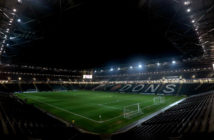The Premier League has had a difficult weekend in terms of officiating, several high profile decisions have been questioned. The quality of refereeing in this country has been put under serious scrutiny yet again.
VAR, or Video Assistant Referee, was used in the 2018 World Cup in Russia, with great success. Statisticians claim 99.3% of the calls were correct, whilst even some of that 0.7% deemed wrong were contentious.
The Premier League clubs had an opportunity to introduce this process to the league in April, but voted against the implementation of the technology which impressed so much in Russia.
The video system will never totally eliminate mistakes from officials, as the rules of the game have grey areas which even multiple replays could not solve. The question of whether a player was in fact interfering with play can not be definitively answered by a video replay, such as the Charlie Austin goal disallowed in the 1-1 draw between Southampton and Watford.
But the system can clarify mistakes on those rules which are set in stone. Another example from the weekend was the build up to Mohamed Salah scoring the opening goal against Fulham. The Liverpool goalkeeper Alisson Becker took a quick free kick whilst the ball was still moving, meaning the referee should have brought play back and forced a retake of the free kick. This would have allowed the Fulham players to recover and get in shape, preventing Salah with a free run at goal.
One of the biggest arguments against the implementation of VAR has been the time taken to carry out to checking process. Referees can gain advice over intercom from the team of officials who monitor the replays, and they are still unsure, are able to view the incident themselves, from a monitor on the side of the pitch.
The game is becoming increasingly fast, intense and each goal is worth millions to clubs in the Premier League. The referees will continue to be berated by fans, who now have more of a voice with social media at an all time high, unless they are given the appropriate tools to carry out their jobs correctly.
The abuse referees have received in the past is well documented, and continued mistakes as high profile as those we saw this weekend alone will only increase that. Soon, people will not want to do the job, meaning the number of highly trained officials will dwindle, and leave the Premier League in dire trouble.
The introduction of VAR will ease a delay in some cases when goals are scored, or fouls have been committed. But at the World Cup VAR reviews took an average of 55.6 seconds to be completed, whilst on the field reviews took an average of 86.5 seconds.
In this specific case, Charlie Austin’s goal against Watford, it was around 56 second between the goal being scored and the play restarting with a Watford free kick – the incorrect decision. A slight increase in time of 0.4 seconds, and an incorrect call made.
Fans pay extortionate sums of money to watch the Premier League, be it in the ground or on TV, all around the world. Fans want a product that reflects the price they pay, one that is, entertaining, efficient, professional, and most of all fair.
Delays of a few minutes per game will not cause the millions across the world to turn off and begin watching La Liga instead. The Premier League is, as Austin himself stated, the most watched league in the world, and they need to be at the top of their game to maintain that status.
With the threat of a European Super League being touted in recent weeks, the sooner the Premier League implement tools such as VAR to improve the quality of officiating in this country, the better.
FIFA
Nothing Found
Apologies, but no results were found for the requested archive. Perhaps searching will help find a related post.
![Prost International [PINT]](https://prostinternational.com/wp-content/uploads/2021/08/PINTtFontLogoRoboto1536x78.jpg)



